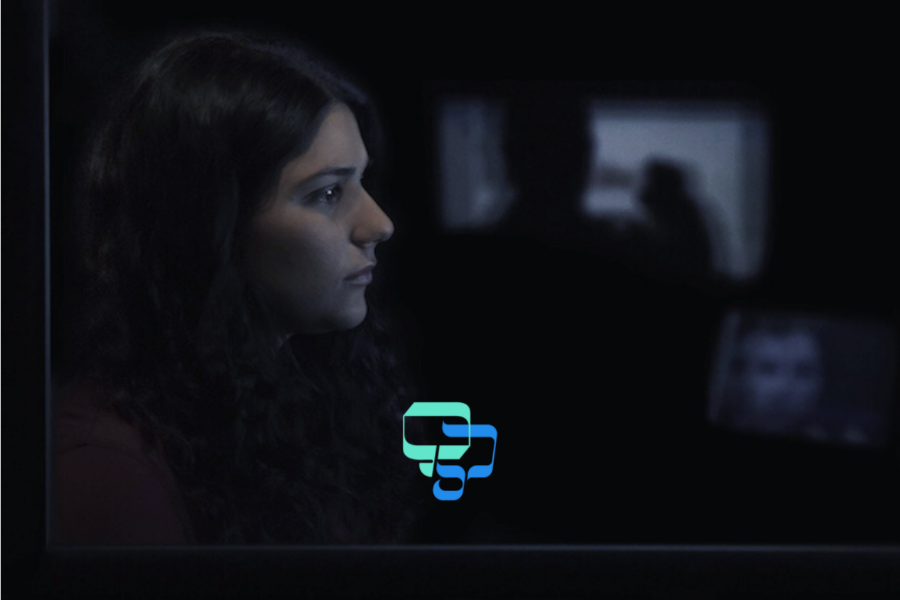
This film review, from SNS Volunteer Dominic, is the second of two reviews of recent films that look at the powerful impact of the ongoing conflict in Israel and Palestine on people's lives. You can read the first review, of the documentary 'Mayor' here. The best place to watch The Viewing Booth is directly from the film's website, here. It's also available to rent from dafilms.com. If you're interested in other films, documentaries and TV shows about Israel & Palestine, check out our lists - Part One and Part Two.
There is a comfort in the position as a viewer, a security, that quite often goes unnoticed. In fiction, this most ostensibly takes the form of action or horror films. Genres so terrifying or physically improbable that we can experience them without fear of real-world effects. In documentary or actualised filmmaking, this allows us to see a fragment of a moment that would’ve been lost from our knowledge of the world. But what happens when our act of viewing is itself caught on camera? Is that comfort, the comfort of sitting in a darkened room interpreting in our own way without judgement, lost? What would it feel like to have our own viewing experience questioned, watched by others and ultimately, watched by ourselves?
This is one of the many ideas that Ra'anan Alexandrowicz’s The Viewing Booth attempts to unpack. At times frustrating, existentially dense, a tad too focused, and often upsetting, The Viewing Booth is a brave departure from the mainstream crop of heavily-narrativized documentaries currently being released. Alexandrowicz’s has attempted something far bolder, even in the intensely small scale that it operates on, whilst not always managing to pull off what it feels like the film is aiming for. Even then, it is a film without a single idea that could be easily encapsulated and put on a poster. In and of itself, this an achievement.
The supposed basis of the film is that director, writer, and editor Ra'anan Alexandrowicz has invited 7 students to his “viewing booth”, to watch online videos from the Israel-Palestine crisis and react to them in real time, all caught on camera. What we see in reality is merely the reaction of one student, Maia Levy, a Jewish-American with strong personal beliefs intertwined with Israel.
During the first half she undergoes the same process as all the other students, none of whom we ever see. She watches clips, mostly filmed on phones, from across the political spectrum in Israel. Those of both a pro-Israeli and pro-Palestinian nature. Her reactions include suspicion, as she consistently questions the validity of the Palestinian footage. (Interestingly she always refers to them as “Arabs”, rather than by their national identity). She is also at times empathetic, for example at the sight of Palestinian children being woken up at night by Israeli soldiers. But she usually creates an out, an idea or reason in her head for her not to feel too awful about the things she is seeing.
In its first half, the film is an interesting delve into the mind of a pro-Israeli American and her prejudices. Watching the human brain work in real time to support its belief system is quite a remarkable experience. But the film is so granular in its investigation, only showing us one identity, one viewpoint, that it feels insufficient.
The second half is where the film pushes beyond this boundary into something quite remarkable. Inviting Maia back 6 months later, Alexandrowicz has now edited footage of the videos she watched alongside that of her reactions. He now wants Maia to view herself viewing these videos. What ensues is an honest conversation about both Maia’s and Alexandrowicz’s belief systems and their goals. His, as a filmmaker, to find his perfect audience and see whether minds can truly be changed through film. Hers, as someone sympathetic to the mainstream Israeli narrative and as student, to extend her knowledge of the world without having her political and religious identity completely torn apart. It is a riveting final 20 minutes and of immense value to anyone who wishes to further their understanding of dialectic, and the human mind’s capacity for personal persuasion.